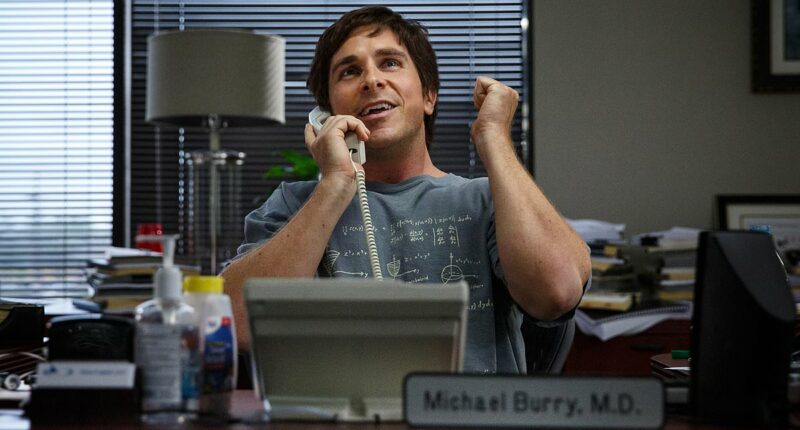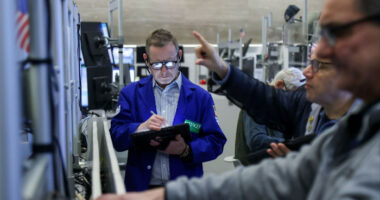Share this @internewscast.com
For investors, one of the most captivating narratives this past month has been unfolding.
Michael Burry, renowned for his prescient call on the 2008 financial meltdown—a tale brought to life by Christian Bale in the film The Big Short—had been wagering against technology stocks.
Burry’s American hedge fund, which famously anticipated the downfall of mortgage-backed securities that shook the global economy, had placed substantial bets against leading artificial intelligence (AI) companies, a strategy commonly known as short selling.
He speculated that the stock prices of Nvidia, a semiconductor titan with a staggering market value of £3.6 trillion whose shares surged 1,352 percent over five years, and Palantir Technologies, a software powerhouse with shares climbing 1,108 percent in the same timeframe, would decline.
In a surprising turn on Thursday, Burry revealed he was shutting down his hedge fund after market dynamics shifted against his predictions. This move underscores the perilous nature of betting on stock price movements, despite the allure of substantial gains when correct.
He joins a roster of prominent investors who had warned of a potential downturn in the AI market, aiming to benefit from its anticipated collapse.
But can ordinary investors do the same? Yes, but only if they are willing to take some serious risk.

Christian Bale as Michael Burry, the investor who famously made billions for predicting the 2008 global financial crisis, in The Big Short
What is shorting?
Usually when you invest, you are banking on the company’s share price rising – typically in the long term – to make a profit. This is known as ‘going long’.
Short-selling is simply the opposite: you are betting on a firm’s share price falling.
It is sometimes considered a controversial practice, with some saying it is unethical to profit from a company’s failure – and in past financial crises has even been temporarily banned to help markets stabilise.
The concept is central to films such as Margin Call, Trading Places and of course, The Big Short, which was based on a true story of investors (including Burry) who predicted the US sub-prime mortgage crisis.
Short-sellers are doing nothing overtly wrong. They are simply investors who believe certain stocks or markets have been overvalued and will revert in the future. They take a short position.
Technically, when you short a company, you effectively borrow its shares and sell them to other investors with the aim of buying them back in the future at a cheaper price.
Let’s use the example of Company A, whose shares are priced at 100p each. You borrow 100 shares from your broker and immediately sell them for the same price. You now have £100, the value of those shares, in cash.
Let’s say your hunch is correct and the share price falls to 70p. You can now buy 100 shares for £70 and return them to your broker for the original price of £100. That leaves you £30 in profit.
What are the risks?
The main risk is that the share price rises instead of falls.
Continuing the above example, if the shares rise to 130p, they will cost you £130 to buy back when you need to return them to your broker, leaving you £30 worse off.
When you ‘go long’ on a stock, the worst that can happen is the value falls to zero and you lose all of the money you invested.
But when you short, the amount you can lose is unlimited because there is no cap on how far the share price could rise. This is a major risk.
There are also fees to consider. Short-sellers typically trade through a so-called margin account, a type of investment account that lets you borrow money or shares. Buying on margin is where you buy more shares than you can actually afford (or want to pay for), so is effectively taking on debt to create your short position.
Just as when you borrow money through a credit card, loan or mortgage, there is interest to pay when you borrow shares. Those costs usually accumulate daily so, if it takes a long time for the share price to fall, charges can rack up while you are waiting for your bet to come good.
There will be what is known as a margin requirement, which means you’ll need to have cash in the account to cover a proportion of the trade – often 25 per cent or more. A margin call is where the broker requires you to deposit more cash, perhaps because the share price has gone up so your cash no longer covers the margin requirement.
This can be a huge problem if investors suddenly need to find a large sum of money to cover their trade and do not have it readily available.
Another risk to be aware of is the ‘short squeeze’, says Chris Beauchamp, chief market analyst at IG Group.
This is when a falling share price begins to recover, causing some short sellers to buy back their shares in order to limit their losses.
This, in turn, drives the price higher, which causes more short-sellers to do the same, creating a domino effect.
‘This is why, even in the most dramatic share price declines, sudden rallies of 20-40 per cent or more are not uncommon, even if the downtrend reasserts itself eventually,’ says Beauchamp.

Jensen Huang, the chief executive of Nvidia, showing off his tech at a conference in June
Can I go short?
Yes. But, as we have seen, it is complicated, risky and can be expensive if the shares you bet against either do not fall, or take longer to fall than you expected.
Ordinary investors who want to make bets against the market are more likely to opt for spread-betting or to use a type of investment known as a Contract for Difference (CFD), says Jason Hollands, from the wealth manager Evelyn.
These allow investors to take short positions without the need to actually borrow or trade shares – they are essentially a type of financial gambling, and are incredibly risky.
The Financial Conduct Authority, the City regulator, has strict rules around how they can be advertised.
An investigation by the regulator to see if CFD providers were complying with its Consumer Duty rules, which stipulate that firms must deliver good outcomes, clear communications and provide fair value to their customers, found some were failing. It warned that some customers were incurring significant charges on their trades, which were not being adequately disclosed up front.
A CFD allows you to speculate on price movements without actually owning the asset. It is essentially an agreement – or contract – between you, the investor, and someone else (known as the counterparty) to exchange shares at a specified future price. Bear in mind that this type of investing is not done through an Isa, so any gains you make will be liable for capital gains tax (CGT).
Spread-betting is similar, but doesn’t require a counterparty. This is where you bet a stock market, share or asset price such as gold will move a certain way. This does not involve buying or borrowing shares, instead you usually stake an amount for each point an asset moves.
For example, you might bet £10 for each point the Nvidia share price falls – if its share price dropped by $1, that is 100 points, and you would make £1,000. And because it is classified as gambling, profits are not liable for CGT.
Losses can particularly spiral if you take so-called ‘leveraged’ trades, where you borrow money to amplify your bet.
For example, if you had staked £10 a point on Nvidia as above, but on a three times leveraged trade, you could triple your profit or loss.
If its share price rose by $1 (100 points), you would lose £3,000.
‘About 67 per cent of retailer investor accounts on spread-betting and CFD platforms lose money, so this is not for the faint-hearted,’ warns Jason Hollands.
One way to protect yourself to some extent is to put in place a stop loss.
In short-selling, this is where you set up an order on your account to automatically close the trade and rebuy the shares once they have risen by a certain amount, for example 10 per cent, to avoid falling victim to unlimited losses. If you are ‘long’ a stock (i.e. hoping its share price will rise), you would do the opposite and set the order to sell the shares when they fell by a specified amount.
Safer options
Because of the risks and expertise involved in short-selling, this is an area where it can make sense to employ an expert.
Funds in the Targeted Absolute Return sector can be a good choice. These have a remit to deliver a positive return, regardless of what is happening in the stock market or economy, and are often able to take short positions on assets to achieve that goal. They don’t tend to shoot the lights out when the stock market is soaring, but offer protection in volatile times.
The Argonaut Absolute Return fund has a strong track record at times of uncertainty. Its fund manager, Barry Norris, took a short position against the German payments company Wirecard before it collapsed in 2020, suspecting the firm of fraud.
In his latest video update, Norris told investors: ‘We think it is probably too early to short the AI trade, yet almost certainly too late to be long.’
The fund is up 82.9 per cent over five years.
Hollands likes the Fulcrum Diversified Absolute Return fund as ‘a defensive strategy that invests across multiple asset classes across the globe’.
It aims to limit volatility by investing in a mix of equities, bonds, cash and other assets. In its latest fund factsheet, the team said that a continued surge in AI-related themes had helped to underpin performance. The fund is up 34.7 per cent over five years.

Tech sell-off
Do not underestimate the risks in short-selling and spread-betting. This type of speculative investing is not a long-term investment approach for your hard-earned nest egg.
Those who fear a market crash is coming may do better to think about investments that’ll hold up better or thrive in a tech sell-off.
Beauchamp suggests utilities companies such as United Utilities and Centrica.
‘Such businesses still suffer share price declines in a sell-off, but don’t fall as much as some of the riskiest sectors and they continue to pay dividends,’ he says.
Simon Edelsten, from Goshawk Asset Management, likes consumer staples companies, which make food, cleaning and cosmetics products that people will continue to use regardless of what happens in the stock market or economy. He points to Nestle, which owns brands including Purina pet food, Nespresso coffee and Perrier water, as one example of a company that delivers steady growth and a reliable dividend.
Justin Oliver, chief investment officer at Canaccord Genuity Funds, suggests finding companies that do not develop AI but will be long-term beneficiaries of it.
Healthcare and biotechnology firms, for example, can use AI to improve the efficiency of their businesses. ‘AI can be used to spot patterns in large medical trials that a human might not recognise, or suggest particular compounds as good candidates for drug development,’ he adds.
So should investors wait until after a crash to pile into the market when share prices are cheap?
It is a risky strategy because it is difficult to predict when the stock market has reached its nadir. Every market crash is different, and so is its recovery.
Simon Edelsten suggests drip-feeding money into investments slowly after a market fall. ‘You need to be vigorous about selling shares when the market is near its peak, but you never have to be vigorous about putting money back in,’ he says. ‘Sell at the sound of the trumpets and buy when there’s blood on the streets.’










